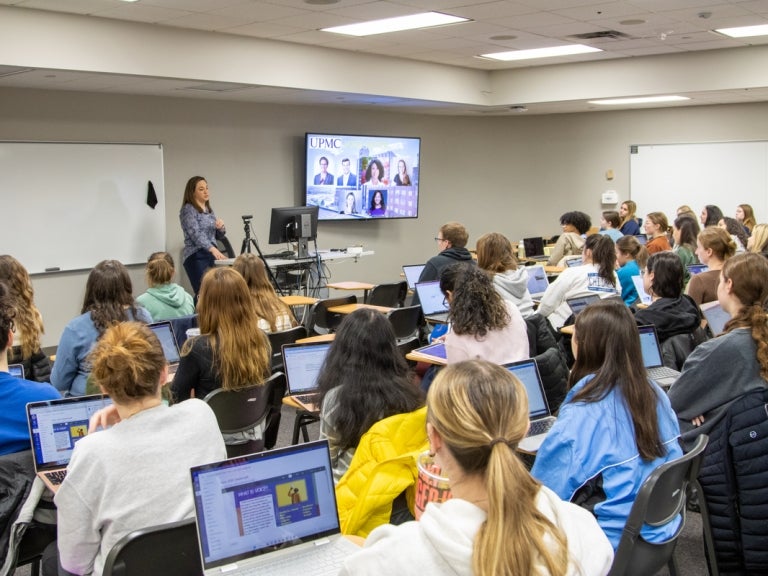
Communication Science classroom, led by Assistant Professor and Director of the Undergraduate Program in Communication Science, Ali Lewandowski
1. You want a versatile major that will prepare you for the “real world.”
Pitt offers over 100 undergraduate majors—as a new college student this can be equally exciting and overwhelming. If you’re struggling to choose, you will find that Communication Science checks off a lot of boxes on the proverbial list. Communication is a fundamental skill in all aspects of life and gaining a foundational understanding of the science behind it is beneficial in all environments.
The Communication Science program is a blend of cognitive, anatomical, neurological, physiological and language sciences. You will be exposed to evidence-based practices, introductory research and clinical methods, discussions surrounding issues of equity, justice and inclusion, and the importance of interprofessional collaboration. When you graduate with a bachelor’s degree in Communication Science, you will have a collection of transferable skills that you can apply wherever you go including directly into the workplace.
2. You want to be a Speech-Language Pathologist or Audiologist.
Have you ever interacted with someone who had a stroke and may be relearning how to use speech and language? Do you have a family member who struggles to keep up with dinner table conversations due to hearing loss? As a Communication Science major, you will participate in approximately 47 credits worth of challenging and stimulating coursework that will prepare you for a career in either speech-language pathology or audiology. Given that these careers require additional education in a graduate or doctoral program, it is essential that you receive exceptional, applicable undergraduate training to be successful. That’s exactly what you will get with a Communication Science degree from Pitt!
3. You know you want to work in a health-related field, but you’re not sure what that looks like yet.
Did you come to Pitt thinking you wanted to be a doctor? Did you quickly realize that perhaps it wasn’t the best path for you? You’re not alone. It’s common that students who want to work in health care gravitate towards the “pre-med projection”—but the truth is, when it comes to choosing a career in health care, the world is your oyster. With a degree in Communication Science, you will be in a unique position to apply for a variety of health and science graduate programs including Occupational Therapy, Physical Therapy, Physician Assistant Studies, Public Health, Dental School, Social Work, Allied Health and more!
4. You want exposure to outstanding research opportunities.
In the Communication Science and Disorders Department, we have over sixteen different research labs. Maybe you have always wanted to get involved with research or maybe the mere mention of “research” intimidates you. No matter where you are along that continuum, there is a place for you. You may wish to be a participant in a study, work one-on-one with a faculty member on a topic of interest as an independent study, volunteer to help collect and analyze outcome data, or secure a role as a research assistant who helps coordinate and implement active studies. Students can choose to do a thesis (Bachelor of Philosophy), contribute to future publications or learn that pursuing a PhD is a desirable path. Research may be a ubiquitous term, but your involvement with a CSD lab will be unique and rewarding.
5. You want high quality instructors who are invested in your success.

Assistant Professor Mandy Hampton Wray guest speaking in a Communication Science class
The faculty who teach in the Communication Science and Disorders Department are the heart of the undergraduate program. Not only are many of these individuals renowned researchers in the field, but they genuinely strive to connect with students and prioritize mentorship. Our graduate programs for Speech-Language Pathology and Audiology are nationally ranked #3 and #7, respectively. This is largely due to our expert faculty members. In the undergraduate program, students have the opportunity to learn from these instructors, engage in their research and receive personalized guidance.
----------
Written by:

Ali Lewandowski, MA, CCC-SLP
Assistant Professor and Director, Undergraduate Program in Communication Science
---
Published February 23, 2023
